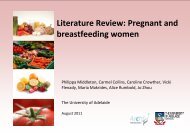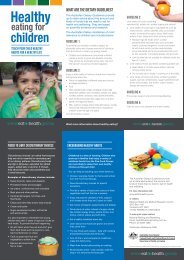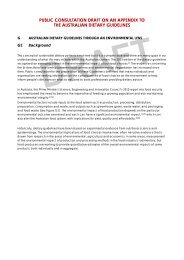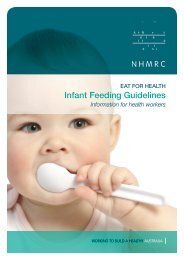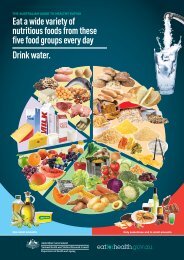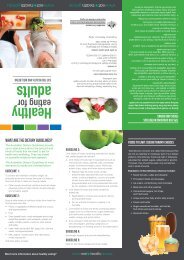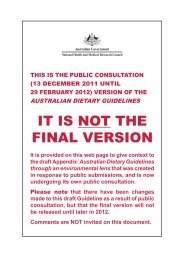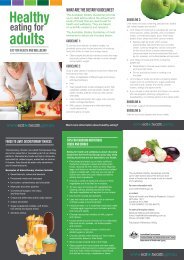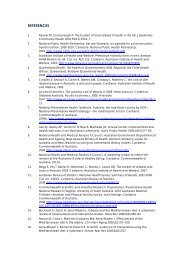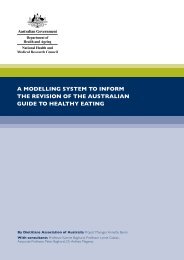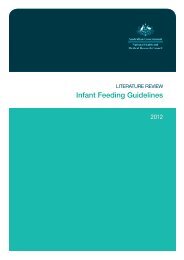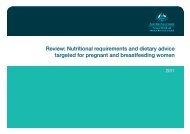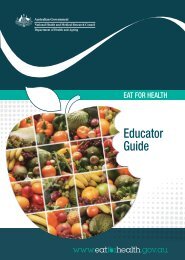Guidelines Dietary - Eat For Health
Guidelines Dietary - Eat For Health
Guidelines Dietary - Eat For Health
- No tags were found...
You also want an ePaper? Increase the reach of your titles
YUMPU automatically turns print PDFs into web optimized ePapers that Google loves.
Evidence statementGradeMilk, yoghurt, cheese and/or alternativesConsuming dairy food is not associated with risk of endometrial cancer.Consumption of dairy foods is not associated with weight change or risk of obesity.Consumption of milk is not associated with BMI or BMI change in childhood.Mean consumption of one serve of dairy food per day is not associated with the risk of breast cancer.Consumption of less than one serve of milk per day during adult life is not associated with risk of osteoporoticor hip fracture.CCCCCWaterConsumption of black tea is not associated with risk of cardiovascular disease.Consumption of coffee is not associated with risk of coronary heart disease.Consumption of coffee is not associated with risk of breast cancer.Consumption of coffee is not associated with risk of colorectal cancer.Consumption of coffee is not associated with risk of ovarian cancer.Consumption of green or black tea is not associated with risk of ovarian cancer.Consumption of green or black tea is not associated with risk of colorectal cancer.CCCCCCCE2Grade D evidence statements that did not inform these <strong>Guidelines</strong>In the systematic literature review (Evidence Report), a number of food, diet, and health relationships wereexamined for which the evidence of an association was Grade D. This was because the evidence was limited,inconclusive or contradictory. These Grade D relationships were not used to inform the development of theAustralian <strong>Dietary</strong> <strong>Guidelines</strong>. Table E2 provides a list of the evidence statements for these relationships.Grade D evidence can inform health professionals about the strength of evidence from recent research, particularlyin emerging areas, and help identify areas where further research on dietary patterns and health outcomes maybe required. Grade D evidence can also assist health professionals correct diet related misconceptions among thegeneral population. <strong>For</strong> example, members of the general population may be inclined to alter their dietary patternswhen the results of a new study are widely publicised in the media.This evidence, while useful as mentioned above, was not used in the development of Guideline statements.Table E2: Evidence statements (Grade D) that did not inform the Australian <strong>Dietary</strong> <strong>Guidelines</strong>Evidence statementGradeVegetablesThe effect of total vegetable consumption on gastric (stomach) cancer is inconclusive (Evidence Report, Section 2.5).The effect of total vegetable consumption on the risk of breast cancer is inconclusive (Evidence Report, Section 2.6).The effect of total vegetable consumption on the risk of colorectal cancer is inconclusive (Evidence Report,Section 2.8).The effect of total vegetable consumption on the risk of lung cancer is inconclusive (Evidence Report, Section 2.7).DDDDAppendicesNational <strong>Health</strong> and Medical Research Council125



